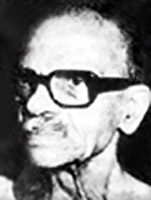 Kainikkara Kumara Pillai was a Malayalam dramatist, essayist, and actor. He was a brother of K. Padmanabha Pillai. Kainikkara Kumara Pillai worked in several capacities, as headmaster, professor, theatre producer, and editor. His service was immense as an educationist and as a literary critic his observations carried intensity and authenticity. He pioneered the Tagorean mystic poem in the 1930s, and then turned to Gandhian literature, editing and producing several books. Kainikkara Kumara Pillai was also an admirer of Sri Aurobindo. He contributed greatly to the reawakening in national and social life as a father figure and philosopher in the cultural field.
Kainikkara Kumara Pillai was a Malayalam dramatist, essayist, and actor. He was a brother of K. Padmanabha Pillai. Kainikkara Kumara Pillai worked in several capacities, as headmaster, professor, theatre producer, and editor. His service was immense as an educationist and as a literary critic his observations carried intensity and authenticity. He pioneered the Tagorean mystic poem in the 1930s, and then turned to Gandhian literature, editing and producing several books. Kainikkara Kumara Pillai was also an admirer of Sri Aurobindo. He contributed greatly to the reawakening in national and social life as a father figure and philosopher in the cultural field.
Kainikkara Kumara Pillai`s versatility, perfectionism, and personal ideals of moral dignity formed an inspiring example to the younger generation. His writings exhibit a high sense of ethical and spiritual values, maturity, and propriety. As an actor-dramatist in amateur Malayalam theatre Kainikkara Kumara Pillai shaped some excellent original plays like Harishchandran in 1933, Mohavum muktiyum or `Desire and Liberation` in 1937, Premaparinamam or `Love`s Evolution` in 1940, Agni-pariksha i.e. `Fire Trial` in 1942, and Veshangal i.e. `Characters` in 1946. He also translated Shakespeare`s Antony and Cleopatra. In 1940 Veshangal departed from seriousness to light satire. Kainikkara Kumara Pillai died in 1988.




















